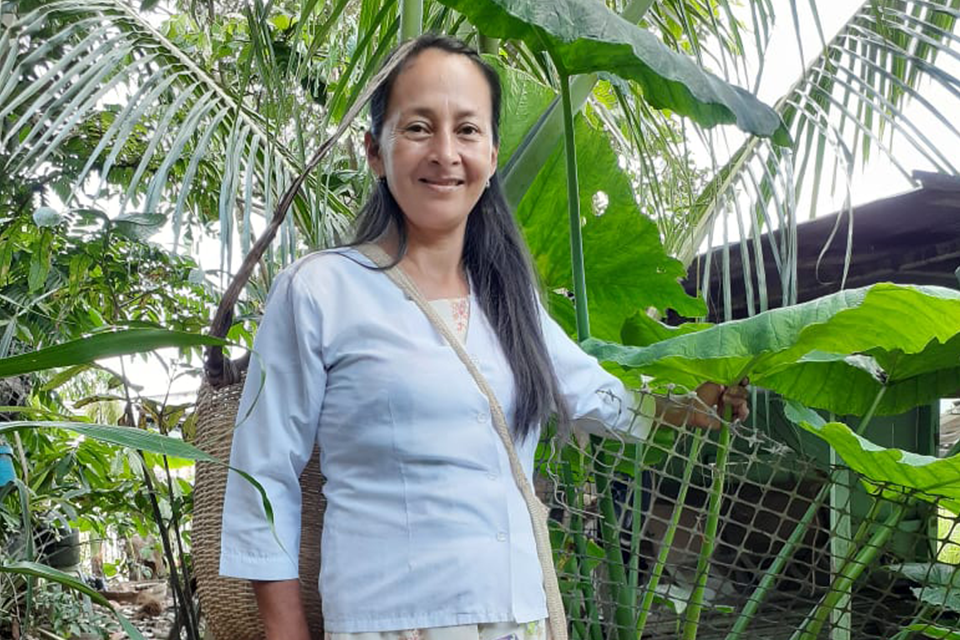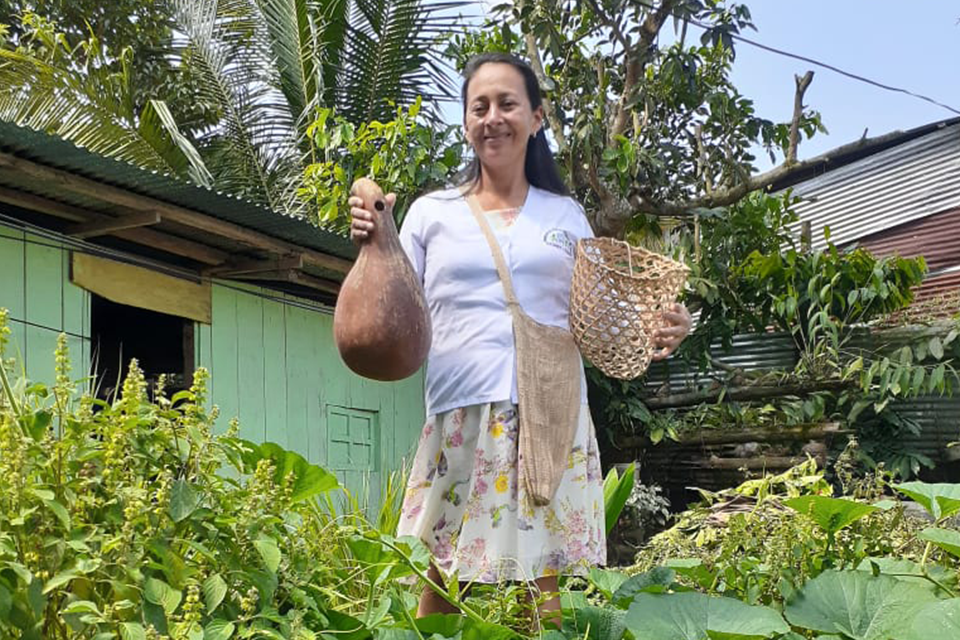Mariela Casanova: "Indigenous women can provide solutions to climate change and strengthen the food security of their families."
Mariela Casanova has lived for over 30 years in the Awá community of Santa Marianita. As an indigenous leader, she is committed to rescuing the Awá culture through ancestral knowledge related to food security and climate change adaptation. Casanova, 51, is vice president of the Federation of Awá Centers of Ecuador, which groups 26 communities. She focuses on strengthening the capacities of indigenous women to maximize their potential and become agents of change.
Date:

The border area between Ecuador and Colombia is home to several Afro-descendant and Awá communities. This territory faces many social, economic, and climatic vulnerabilities that make it a region with a high level of food insecurity, compromising the well-being of the women and men who live there.
Not all people in the Afro-descendant and Awá communities have access to healthy and nourishing food, including the population with the lowest consumption, women, and girls. However, they are the ones who take care of the household and are responsible for providing food for their families.
Most of them are indigenous women who share a powerful bond: to strengthen the food security of their families and communities through their ancestral culture and actions and solutions that reduce the climate impact on their territory. They are in charge of sharing all the knowledge transmitted by their grandmothers and grandfathers through these processes.
"We know how to fish without contaminating the water. We maintain our gardens, so they do not contaminate the soil," says Mariela Casanova, an indigenous leader who defends her territory against climate change, raising awareness in her community about how it affects agriculture and food sovereignty.
Mariela is vice president of the Federation of Awá Centers of Ecuador (FCAE), which includes 26 communities. She, along with other colleagues, maintains a strong commitment to rescuing the Awá culture through ancestral knowledge related to food security and adaptation to climate change.
A faithful defender of women's rights in her community, being vice president of the FCAE allows her to speak up for her fellow women, "I was thrilled and extremely proud to be appointed to this position since there are not many women who represent us and that has to change."
Through the project "Building Adaptive Capacity through Food and Nutritional Security Actions in Vulnerable Afrodescendant and Awá Communities in the border area of Colombia and Ecuador," Mariela deepened her seed management knowledge community gardens, reforestation, among others.
"Last December, I had the opportunity to work as a parabiologist, and I learned more about seed banks. The women from my community have great ancestral knowledge about crops and how to take care of the environment," says Casanova.
One of the examples that Mariela highlights are the forage banks, which allow reforesting of different cultivation areas and serve as food for birds. This experience shows how communities learn to prepare their land and generate their own ecologically responsible products.

Mariela acknowledges UN Women's support in incorporating the gender approach in the project. For her, women's participation in producing healthy and diverse food is fundamental.
"It should be an issue for both men and women. We must manage the economy of our families and our communities, work together, and that can only be achieved when we start talking about gender equality in the communities and train young women to have a voice and a vote," Mariela assures.
Women's political participation in these communities is reduced by the time they spend on domestic chores. This reduces their opportunity to participate in decision-making actively.
For Mariela, strengthening women's capacities is critical for them to become agents of change. "We know how to produce our gardens naturally, without using chemicals; we can contribute solutions to climate change, and we also encourage our children to maintain the forests and take care of the streams and creeks.
The indigenous women of these communities are the primary caretakers and providers of life in the countryside, and their right to autonomy and access to water, land, and seeds must be guaranteed by community leaders.
Mariela focuses on strengthening the participation of women in her community, personally inviting several of them to be part of the activities that incorporate the gender perspective and allow reaching equal opportunities between men and women to address climate change.
One of her main incentives to continue in the struggle is to strengthen the participation of women in her community and all who are part of the FCAE, not only concerning food security but in all areas of their lives. For her, all women have capabilities and are valuable; they produce, care for, and bring life to their territories and have the right to achieve economic autonomy.
"Gradually, we are making progress in achieving the participation of women in the Awá community. We helped women become leaders, and now we have a woman president in the Santa Marianita Community."
Despite the challenges brought about by the current health crisis, the communities resisted because of the women's preparation. "Even though we were locked in, we were able to supply ourselves in our community gardens, and women contributed with our knowledge of ancestral medicine."
The climatic and food challenges faced by the Afro-descendant and Awá communities on Ecuador's northern border are varied. However, Mariela is confident that empowering women will allow the development of more resilient, solid, and egalitarian societies in which women's voices are present in decision-making in their homes and communities.
"We have confidence in ourselves, in our voice. We are indigenous women who can provide solutions to climate change and strengthen the food security of our families," Mariela assures.
Mariela sees a positive future not only for her community but for all indigenous communities in the country. For her, everyone, the State and civil society organizations must work together for the well-being of indigenous peoples, especially indigenous women.
"I have always said, as part of the Awá nationality, men and women fight for social welfare, seek unity and territory, and ancestral recovery. There is something we call 'the great binational Awá family', symbolizing the unity of people from Ecuador and other countries. That unity will only be possible when peace and security are guaranteed in our territories, and our culture is valued so our children can enjoy their rights".